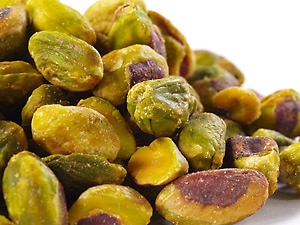When you are eating Pistachios in Nigeria, you will stand out. Pistachios are prized for their unique, slightly sweet flavor as well as for their intriguing viridescent hues. Pistachios are one of the world’s oldest nuts, being grown in the Middle East for thousands of years. They are even mentioned in the Old Testament of the Bible, which indicates their rich history as a prized food source (American Pistachios, 2014).
Like all nuts, pistachios in Nigeria are rich in beneficial nutrients. However, pistachios in Nigeria have some unique properties that set them apart. Their versatility means that you can eat pistachios alone as a snack, on top of a salad, mixed with dried fruits in trail mix, in baked goods, or as a crunchy coating for fish or meat. In addition to these distinctive traits, consider the following nutritional benefits of pistachios in Nigeria as an added perk to their particularly pleasant palate.
Pistachios are a Rich Protein Source
Most nuts contain large amounts of protein relative to their size, and pistachios are no exception. A 1-ounce serving of these nuts (approximately 49 pistachio kernels) contains 6 grams of protein (Self Nutrition Data, n.d.). Your body breaks this protein down into its constituent amino acids, which can be used to repair tissues or to create new molecules. Plus, eating protein-rich foods helps you feel satiated, reducing your cravings for unhealthy foods later on. This makes pistachios the perfect mid-afternoon snack.
They Have a Healthy Ratio of Beneficial Fatty Acids
Pistachios are a high-fat food, but that is not a bad thing. Per serving, pistachios contain 13 total grams of fat (Self Nutrition Data, n.d.). However, only 2 grams of fat are saturated fats, the unhealthy fats that are associated with higher risk of cardiovascular disease (American Heart Association, 2016). The rest of the fats are polyunsaturated and monounsaturated fats, which actually protect the heart.
This includes omega-3 fatty acids, a type of fat that has been associated with lower levels of “bad” cholesterol and higher levels of “good” cholesterol (Penn State News, 2010). Pistachios contain alpha-linoleic acid (ALA), a beneficial type of omega-3 fatty acid that can also be converted to DHA and EPA, the two other forms of omega-3s that are only found in animal sources. Thus, vegetarians and vegans may eat pistachios as a source of the omega-3 fatty acids their bodies need.
Pistachios Contain Beneficial Antioxidants
As our cells grow older, they accumulate oxidative damage. This can be related to the presence of free radicals, which can cause considerable damage to cells. A class of molecules called antioxidants can sweep up these free radicals and reverse some of the cellular damage.
Pistachios are an excellent source of antioxidants, including lutein, beta-carotene, and gamma-tocopherol (Penn State News, 2010). Beta-carotene serves as a precursor to vitamin A, while gamma-tocopherol is used as a precursor to vitamin E. Both vitamin A and vitamin E themselves have very high antioxidant activity, making pistachios a great way to reap some of the oxidative damage-fighting effects of these vitamins. In a randomized study of the effects of pistachios, researchers found that incorporating these nuts into the diet was associated with lower levels of harmful LDL cholesterol (Penn State News, 2010), possibly because of the antioxidants present in pistachios.
Pistachios are a Source of the Mineral Phosphorus

Phosphorus is an element that is essential for our proper physiological functioning. Not only does phosphorus make a structural component of all cells, but it also regulates a variety of physiological reactions (Calvo, 2014). Getting enough phosphorus ensures that your cells can continue to produce energy and also strengthens the bones. A 1-ounce serving of pistachios contains 137 mg of phosphorus, 14% of the Daily Value (DV) for the nutrient (Self Nutrition Data, n.d.).
Pistachios Contain Vitamin B6
Vitamin B6 has myriad health benefits. Failure to get enough vitamin B6 has been associated with elevated risk of cardiovascular disease, certain types of cancer, and cognitive dysfunction (Office of Dietary Supplements, 2015). Thus, getting vitamin B6 through your diet may improve your cardiovascular health and keep your brain sharp. Women need 1.5 mg of vitamin B6 per day, while men need 2 mg per day. A 1-ounce serving of pistachios contains 0.4 mg of vitamin B6, helping you reach your daily recommended intake of this beneficial vitamin.

